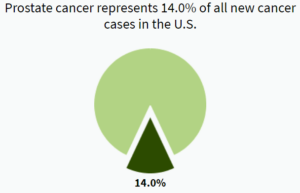Nearly 269,000 men in the U.S. are diagnosed every year with prostate cancer. Almost 35,000 die, so how long can prostate cancer go undetected?
When prostate cancer has spread to other sites in the body (metastasis), the prognosis is quite grim.
But when it’s caught early, the prognosis is excellent.
“The goal of prostate cancer screening is to identify those men with prostate cancer that, if undiagnosed, could metastasize,” says Matthew Allaway, DO, a urologist who specializes in detecting prostate cancer and the developer of a prostate biopsy technique that improves cancer detection.
“Given we are unable to cure men with metastatic prostate cancer, we hope to find these men when the cancer is still in earlier stages and confined to the gland,” continues Dr. Allaway.

seer.cancer.gov/statfacts/html/prost.html
How many months might a man have various symptoms, that are caused by prostate cancer, before the disease is finally detected (not just suspected, but diagnosed)?
Dr. Allaway explains, “Symptoms often lead to a patient seeing a urologist, but in fact, the vast majority of patients with symptoms [that may seem related to prostate cancer] do not have prostate cancer, but rather, another urologic condition.
“Those presenting with symptoms due to prostate cancer often have advanced disease.
“Some men might experience symptoms for several weeks or months before seeing their doctors.”
Why is it that in some cases, excess time passes before a man realizes he needs to pursue testing for prostate cancer?
“In general, many men are scared of the symptoms they have and what they may represent,” says Dr. Allaway.
“This is ironic, given that the fear should motivate them to seek help sooner, and this hesitation to consult a medical professional is typically seen among men rather than women.”
Though heart disease is the #1 killer, taking out far more people every year than do all types of cancer combined, cancer is still much more feared than is heart disease.
If a man has new-onset chest pain upon mowing his lawn, which then subsides when he stops, then picks up again with more exertion, he’s more likely to be on the phone the next day to get an appointment with a cardiologist.
In fact, he may even stop the lawn mowing and head straight to the ER, fearing a pending heart attack.
But if instead he begins noticing difficulty with urination, a weak urine stream and erectile dysfunction, his mind will often fly straight to prostate cancer – but, he won’t immediately seek medical attention out of fear.
Perhaps this peculiar phenomenon is due to the nature of heart attacks: They drop people like a bomb.
Whereas with cancer, deterioration occurs over a period of time and is loaded with dread and fright.
But the longer a man puts off a medical workup, the more the cancer will spread and become increasingly untreatable.
Though many men every year are diagnosed with prostate cancer, more men actually have other conditions that cause the same symptoms.
“Most men present with symptoms fearing they have prostate cancer, but in fact have another urologic condition,” says Dr. Allaway.
“Some men fear they have prostate cancer when they may have a non-life-threatening condition such as benign prostatic hyperplasia (BPH).”
The lesson here is that you don’t want prostate cancer to go undetected until it has spread to your bones or lungs.
If you’re having urologic issues, make an appointment for an examination. Delaying this won’t make cancer go away, and if it turns out you don’t have a malignant tumor, at least whatever else is causing the problems can be treated sooner.
Some Benign Mimickers of Prostate Cancer
• Benign Crowded Glands
• Distorted Rectal Tissue Admixed with Prostate
• Granulomatous Prostatitis
• Malakoplakia
• Paraganglion
• Xanthoma
 Dr. Allaway is the founder and CEO of Perineologic, a medical device company focused on the development and delivery of technology to improve the safety, precision and efficiency of healthcare options in the field of urology.
Dr. Allaway is the founder and CEO of Perineologic, a medical device company focused on the development and delivery of technology to improve the safety, precision and efficiency of healthcare options in the field of urology.
 Lorra Garrick has been covering medical, fitness and cybersecurity topics for many years, having written thousands of articles for print magazines and websites, including as a ghostwriter. She’s also a former ACE-certified personal trainer.
Lorra Garrick has been covering medical, fitness and cybersecurity topics for many years, having written thousands of articles for print magazines and websites, including as a ghostwriter. She’s also a former ACE-certified personal trainer.
.


























